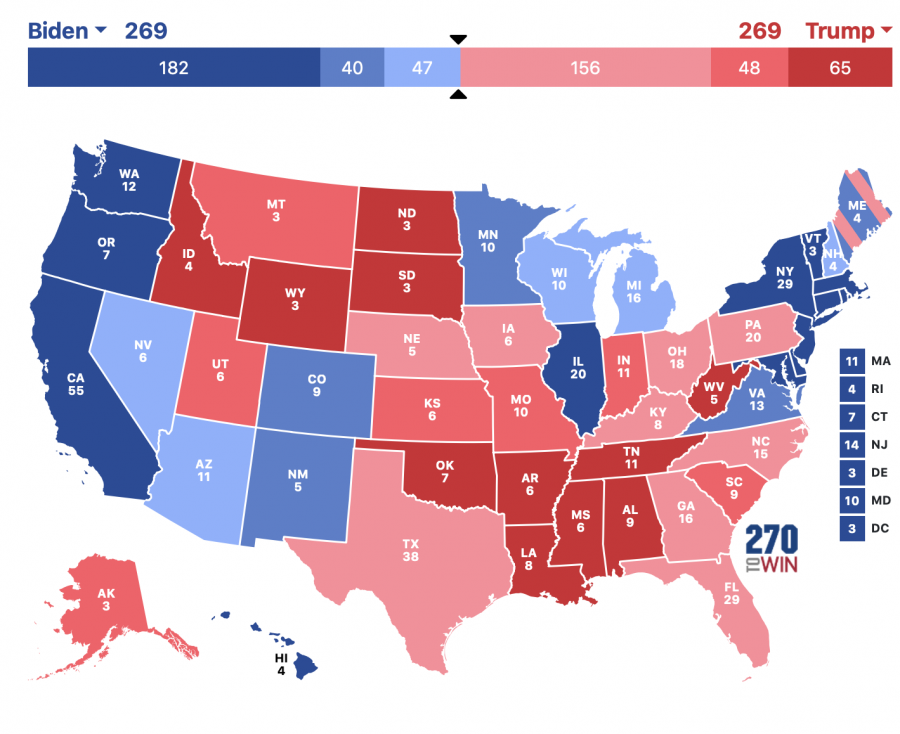Between America’s first mostly mail-in election, an incumbent President hospitalized a deadly virus a month before the election and a White House questioning the validity of the election before results are even announced, it seems like there are a lot of things that could go wrong between now and the inauguration on January 20. Here are some of the different unexpected turns this election could take:
Tie
There is a chance that the 538 electoral votes that help to choose the president will be split evenly between the two candidates, with no one winning the majority. This has happened three times before: in 1801, 1825 and 1837. When this happens, the election defers to the US House of Representatives where each state gets to cast one vote. Right now, Republicans control 26 delegations while Democrats only control 23 (one is tied). However, this election would not happen until the next Congress is seated, and House Speaker Nancy Pelosi has pledged a significant amount of money to try to flip the delegations from small states like Montana and Alaska to prepare for a potential vote in the House. The polling analysts at FiveThirtyEight currently give this a one in 100 chance of happening, so it’s unlikely but not implausible.
Supreme Court
Given the issues surrounding mail-in voting, such as the underfunded postal service, suggestions of large-scale ballot spoilage and placement of faux ballot drop-off boxes by one of the parties, there are many concerns that not all of the ballots will be counted. It is important to note that it is quite likely that we won’t know the result of the election on Nov. 3 because most states only require ballots be postmarked – not received – by that day.
But what happens if some states are still too close to call as we approach the time when the electors vote in mid-December? It is presumed that the Supreme Court will have the power to decide whether to continue recounts or to leave the vote exactly where it’s at, similar to how they decided in Bush v Gore, the case responsible for giving George W Bush the presidency in 2000. The Republicans currently have a 5 – 3 advantage on the Supreme Court which could be increased to 6 – 3 if Judge Amy Coney Barrett is confirmed before the elections (which seems likely). Some Democratic lawmakers, however, are calling for a future Justice Barrett, as well as President Trump’s other two nominees for the bench, Brett Kavanaugh and Neil Gorsuch, to recuse themselves from any decisions regarding the 2020 election.
Trump or Biden Dying
President Trump was recently released from Walter Reed Medical Center and looks like he is on the road to full recovery from the coronavirus. However, both candidates are in their 70s. If one of them were to die before the election, their party would select a new candidate to replace them during the election (likely their Vice Presidential nominee, but ballots have already been sent out in almost all states so the ballot would continue to list the deceased candidate’s name). If a candidate were to die between the popular vote election and the day electors cast their ballots, the situation would be decided on a state by state level. Most states with “binding elector” laws require the elector to cast their ballot for the deceased and then that vote would be transferred to their Vice Presidential nominee.
Trump refuses to leave office or nothing decided by January 20
According to the 20th amendment to the United States Constitution, the current presidential term ends at noon on January 20 no matter the status of the previous November’s election. President Trump has asserted on many occasions that he may not respect the results of the election if they are not in his favor, but the Constitution does not give him much wiggle room. If he does not win the Nov. 3 election and his results are not certified by Congress on Jan. 6, he will be out of office on Jan. 20. If no one is certified the winner of the 2020 election for President or Vice President, Speaker Pelosi, as the next person in the line of succession, will assume the office of the Presidency until the election is decided.






















![Students begin a practice Kahoot for French class. Walter Johnson offers a total of six languages including American Sign Language, Chinese, Italian and more, giving students the opportunity to explore different languages and cultures. “I switched [from Spanish] to Latin freshman year and I love it,” junior Abigial Samuels said.](https://www.wjpitch.com/wp-content/uploads/2024/10/IMG_0976-1200x675.jpg)



















